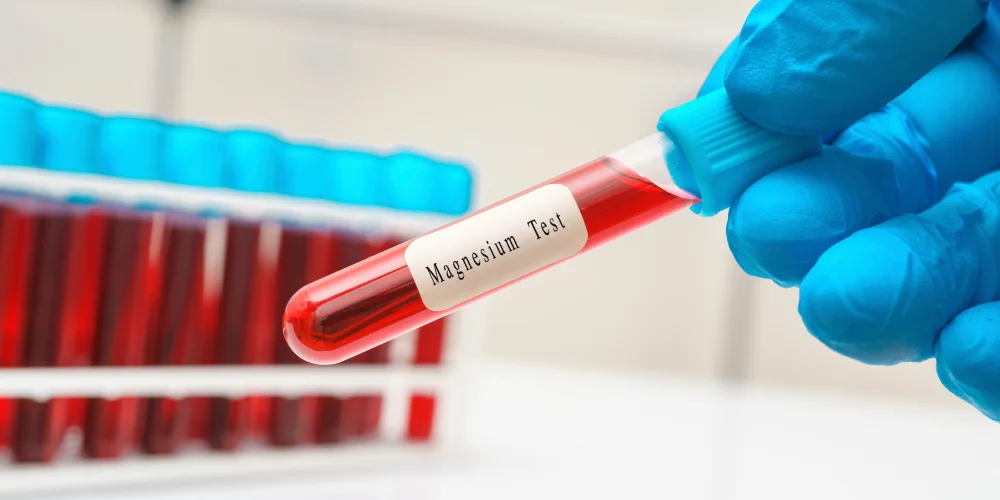S. Magnesium Test
Measuring Serum Magnesium Levels
It is the Serum Magnesium Test is a diagnostic instrument used to determine the level of magnesium present in blood. Magnesium is a vital mineral that is involved in a variety of bodily processes, such as the function of nerves and muscles and blood glucose control and the health of bones. It helps to determine levels of magnesium to identify deficits or overdoses, as well as directing proper treatment and management.

When is the S.Magnesium Test Prescribed?
- Diagnostics of Magnesium Inbalance Diagnostic of Magnesium Imbalance : Magnesium imbalance is a sign of imbalance. S. Magnesium test is utilized to identify the presence of magnesium deficiencies that include hypermagnesemia (low magnesium) or hypermagnesemia (high magnesium). These imbalances may alter the function of muscles the heart rate, muscle function, and general well-being.
- Monitor Certain Medical Conditions : People suffering from conditions like kidney diseases, digestion disorders, the condition of diabetes might undergo S.Magnesium testing to determine the level of magnesium in their blood and help determine the treatment.
- Assessment of Symptoms : Signs like muscle weakness heart rhythms that don’t match and seizures could cause healthcare professionals to request the S.Magnesium test to assess the magnesium level.
Preparation for the S.Magnesium Test
There is no special preparation needed to take this test. S.Magnesium Test. The test subjects can consume food and drinks regularly prior to taking the test. But, it is essential to notify your doctor of any supplements, medications or current illnesses since they could alter the magnesium levels.
Parameters Considered During S.Magnesium Test
The S. Magnesium Test is a diagnostic procedure that quantifies the concentration of magnesium in the bloodstream, typically reported in milligrams per deciliter (mg/dL) or millimoles per liter (mmol/L). Magnesium is an essential mineral crucial for various biochemical processes in the body, including muscle and nerve function, energy production, and bone health. Normal magnesium levels generally fall between 1.7 to 2.2 mg/dL (0.7 to 0.9 mmol/L). Deviations from this range can indicate underlying health conditions:
- Hypomagnesemia (Low Magnesium) : Abnormally low magnesium levels may result from inadequate dietary intake, malabsorption disorders, prolonged diarrhea, or certain medications. Symptoms can include muscle cramps, weakness, abnormal heart rhythms, and seizures.
- Hypermagnesemia (High Magnesium) : Elevated magnesium levels can occur due to excessive intake of magnesium-containing medications or supplements, impaired kidney function, or certain endocrine disorders. Symptoms may include nausea, vomiting, weakness, and in severe cases, cardiac arrest.
Time Required for S.Magnesium Test Report
It is the S.Magnesium Test is an easy procedure. Once a blood sample is taken the results will be available in a matter of hours or the next day. This speedy turnaround time permits healthcare professionals to quickly examine magnesium levels and begin the appropriate treatment if needed.
S.Magnesium Test Price
In Chirayu Super Speciality Hospital, S.Magnesium Test is costing Rs650. This will ensure that patients have access to vital diagnostic tests to diagnose magnesium-related ailments. The cost-effective test aids in the early identification and management of imbalances in magnesium.
Book an Appointment for S.Magnesium Test
Scheduling an appointment for your S. Magnesium Test at Chirayu Super Speciality Hospital in Bhayandar is easy and straightforward. You can schedule your test via contacting our team. We are committed to providing prompt and efficient support to meet your healthcare needs.
What Our Patients Say
Hear from our valued patients about their experiences at Chirayu Super Speciality Hospital and how our care has made a positive impact on their health and well-being.


Efficient and reliable S. Magnesium test services at Chirayu Hospital.


The S. Magnesium test report was detailed, enhancing my health management.


Grateful for the thorough assessment with Chirayu S. Magnesium test.


Professional service and rapid S. Magnesium test reporting at Chirayu Hospital.


Accurate results from Chirayu S. Magnesium test helped guide my treatment.


The S. Magnesium test at Chirayu Hospital provided clarity on my health concerns.
Frequently Asked Questions
Here, we provide answers to some of the most commonly asked questions to help you better understand our services, policies, and facilities. If you have any additional questions, please do not hesitate to contact us.
Symptoms may include muscle weakness, spasms, arrhythmias, and changes in mood.
Yes, consuming foods rich in magnesium, such as nuts, seeds, and leafy greens, can help maintain adequate levels.
Supplementation is based on test results and individual health needs, monitored by healthcare providers.
Causes include kidney disease, excessive magnesium intake, or certain medications.
Frequency depends on initial results and medical conditions; consult with your healthcare provider.